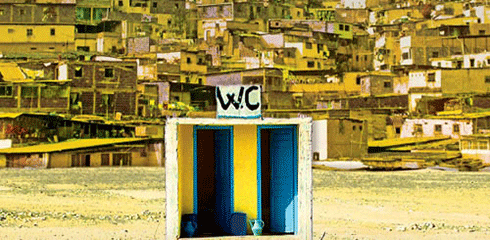
|
Published: 25 November 2013
‘Toilet equality’ essential for sustainable development: UN
With its first official observance of World Toilet Day last week, the United Nations called on the international community to help break taboos around toilets, which are still out of reach to more than one-third of the global population, making sanitation a global development priority.

|
|
While six billion people worldwide have mobile phones, only 4.5 billion have access to toilets or latrines. Credit:
worldtoiletday.org
|
‘Despite the compelling moral and economic case for action on sanitation, progress has been too little and too slow,’ UN Secretary-General Ban Ki-moon said. He noted that sanitation is central to human and environmental health, and essential for sustainable development, dignity and opportunity.
Of the eight anti-poverty targets known as the Millennium Development Goals (MDGs), the sanitation target lags the most, with more than 80 per cent of countries falling behind the national targets they set.
While six billion people worldwide have mobile phones, only 4.5 billion have access to toilets or latrines – meaning that 2.5 billion people, mostly in rural areas, do not have proper sanitation, according to UN figures. In addition, 1.1 billion people still defecate in the open.
According to a joint UNICEF and World Health Organization report this year, the countries most affected are India (626 million without proper sanitation), followed by Indonesia (63 million), Pakistan (40 million), Ethiopia (38 million), and Nigeria (34 million).
‘“Without access to improved sanitation” is a euphemism to describe the undignified life of billions of people,’ said Catarina de Albuquerque, the UN Special Rapporteur on the human right to safe drinking water and sanitation.
Poor water and sanitation cost developing countries around $260 billion a year – 1.5 per cent of their gross domestic product (GDP), the UN reported. On the other hand, every dollar invested in overcoming these problems could bring a five-fold return by keeping people healthy and productive.
Earlier this year, Mr Ban launched a Call to Action on Sanitation to end open defecation by 2025 and build on existing efforts, such as Sanitation and Water for All and the Sanitation Drive to 2015, the date to reach the MDGs.
‘Sometimes it’s a topic that we joke about. But if 20 school buses crashed on First Avenue today, I would guarantee that there would be a response,’ Theresa Dooley, Senior Advisor, Sanitation and Hygiene at the UN Children’s Fund (UNICEF) told journalists in New York.
‘The reality is that that is the number of children that die each day as a direct result of not having access to sanitation.’
World Toilet Day has previously been marked by NGOs and other community organisations around the world. However, it was not formally recognised as an official UN day until this year.
Source: UN



